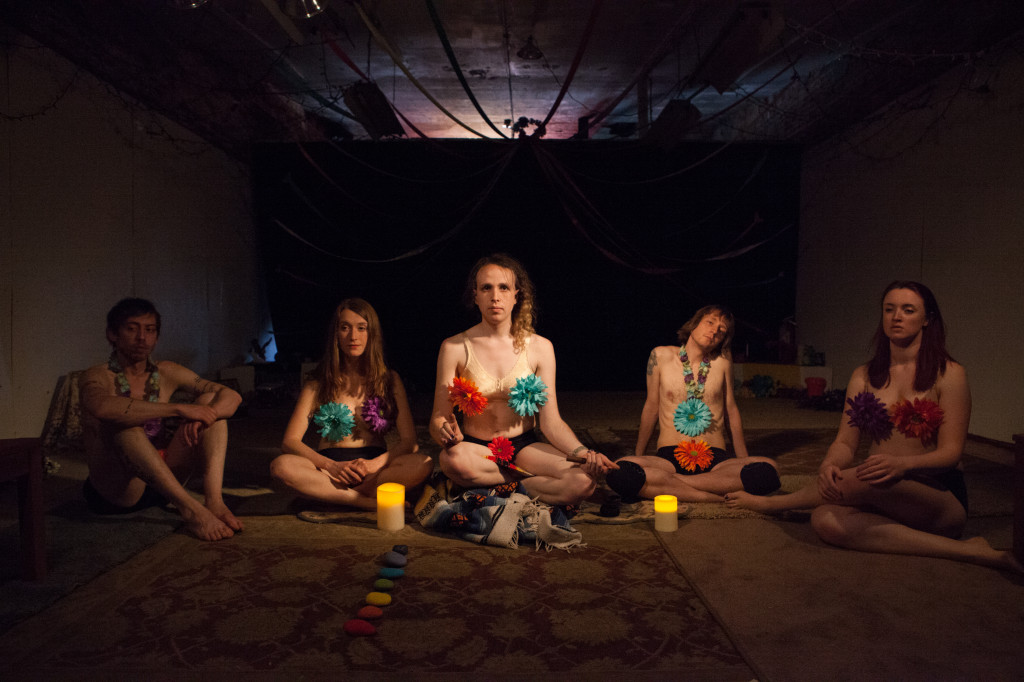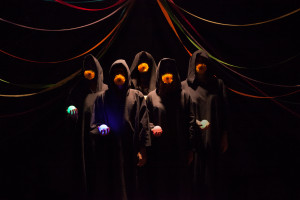
Four Moth People enter the cozy little space in long, dark robes. They hold glowing orbs in their hands. Their hooded heads nod forward, but just visible are bright flowers clench between their teeth. They pace the floor slowly, deliberately (if a little clumsily), and hum with growing intensity, charging the space.
At this point one begins to worry. To worry that these people might be taking themselves seriously—that the robes and glowing orbs have deep meaning we’ll be expected to accept, because as more of them fill the space it gets sillier and sillier. You worry, at the same time, that this is a lampoon, that they’re taking aim at someone’s deeply held spiritual beliefs.
Then, suddenly, they throw off the robes. The big reveal: underneath they’re in their underwear, with flowers over all the important parts. Pitoo! they loudly spit flowers out of their mouths, and then begin a joyful, vaudevillian song and dance.
What MOTHER MOTH PEOPLES takes aim at is a very specific set of people: Lady June, Apollo, Rosebud, Bonesong, and Paul (Caitlin Antram, Bastion Carboni, Amy Frear, Swift Shuker, and Paul Harlan, respectively) a group of pagan initiates, inescapably American and naive, who have cobbled together a religious world out of the bones of ancient human traditions. Prayers to the Goddess, the summoning of the Golem, yoga, and guided meditation all take their places next to rainbow streamers, statues of unicorns, and Enya.

What makes it all doable—and, in the long run, interesting—is the sincerity of the Moth People. Silly though they seem to us, they really do buy everything they’re doing, moment to moment. In her Charge of the Goddess prayer (with lines such as: “for behold, I have been with you from the beginning, and I am that which is attained at the end of desire”), Antram shows a longing, an attention, and a quiet conviction which offsets the Broadway goofiness and the joyful childishness which characterizes other rituals. Shuker, when they become the golem, suddenly possesses the stillness and poise of an icon. In other words, the cast repeatedly steps out of the goofy to earn it with conviction.
The audience takes part, too. We jump the Beltane fires with them—while they sing “Purify our souls by fire!” loudly and with increasing conviction, and whip around orange and red streamers with abandon, apparently feeling the fire possess them.
And genuine ritual finally finds its place. Rosebud (Amy Frear) leads a guided meditation as effective, relaxing and engaging as any I’ve taken part in—if, again, as inescapably silly as the rest of the play (“the blue potato of your throat,” “the purple eggplant of your third eye”).
The text is carefully cobbled together and constantly surprising. I can’t speak for genuine pagans, who might take issue with the patchwork spiritual collage, or really for anyone with deeply held religious belief, who understand physically the power of ritual in building human culture. I’ve used the word “silly” again and again, but what does it mean in this context? It’s certainly not a bad thing, but my serious, critical mind finds itself wondering about the dark sides of these characters. They don’t seem to have much background in faith—they certainly aren’t “doing it right.” I have to guess that they grew up in a secular world, a spiritual void. What drove them to invent this scrambled-up pantheon? What harsh reality lives behind the facade of their ritual? What is the trauma they are attempting to escape? All that can be gleaned in the Moth People is a sort of indomitable silliness, which is both charming and damning: naïveté to the point of near-insanity. What kinds of jobs, I ask, could these people possibly work?
Without any answer to these questions, the play, like its characters, exists in a dream-world. It is an escape, as sort of comfort which is neither tempered nor enriched by a deep knowledge of what it’s comforting us against, an understanding of the dangerous reality against which so many turn to the comfort of religious tradition.
But director Olivia Jorgensen and her Moth People are writing what they know—a lampoon of American privilege from an odd angle, of secular spirituality, bolstered by a genuine sharing of togetherness, affection, and a canny understanding of the potential crossover between live performance and ritual. If they do possess a deeper understanding of religiosity, they keep it close to their chests, opting instead for these silly yet genuine characters. If sadness blossoms up at any point, it is the sad awareness that we are these people: that if we ever attempt to turn to the infinite, the divine, our backgrounds just may leave us looking this silly. [1fiftyone, 151 N. 3rd Street] May 7-10, 2015; brownpapertickets.com/event/1423351.
